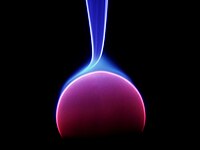
Photo from wikipedia
Abstract This work presents a new application of decay heat measurement based on the calibration and inverse uncertainty quantification (IUQ) of modeling parameters of pressurized water reactor (PWR) fuel assemblies.… Click to show full abstract
Abstract This work presents a new application of decay heat measurement based on the calibration and inverse uncertainty quantification (IUQ) of modeling parameters of pressurized water reactor (PWR) fuel assemblies. This work (i) solves the problem encountered in forward UQ i.e., the lack of fuel vendor proprietary information (manufacturing tolerances of fuel assembly design) and operating condition uncertainties which are based on ad-hoc expert judgement or personal opinion (ii) calibrates the parameters of a fuel assembly model for improved code calculation-to-experiment agreement. The IUQ is conducted under the Bayesian framework and finds the fuel assembly model parameters that are consistent with decay heat measurements. The forward model implements a polynomial chaos expansion (PCE) based surrogate model for a computationally efficient inverse analysis. The approach introduced is then tested with the decay heat calculations of the deterministic code STREAM. Eight input parameters: fuel density, enrichment, pellet radius, clad outer radius, fuel temperature, power density, moderator temperature and boron concentration, are considered. The outcomes of this work include quantification of uncertainties and determination of probability distribution function (PDF) of these parameters, in addition to reducing code calculation-to-experiment discrepancies. These outcomes are important for future studies on the forward propagation of model parameters uncertainties.
Journal Title: Nuclear Engineering and Design
Year Published: 2021
Link to full text (if available)
Share on Social Media: Sign Up to like & get
recommendations!